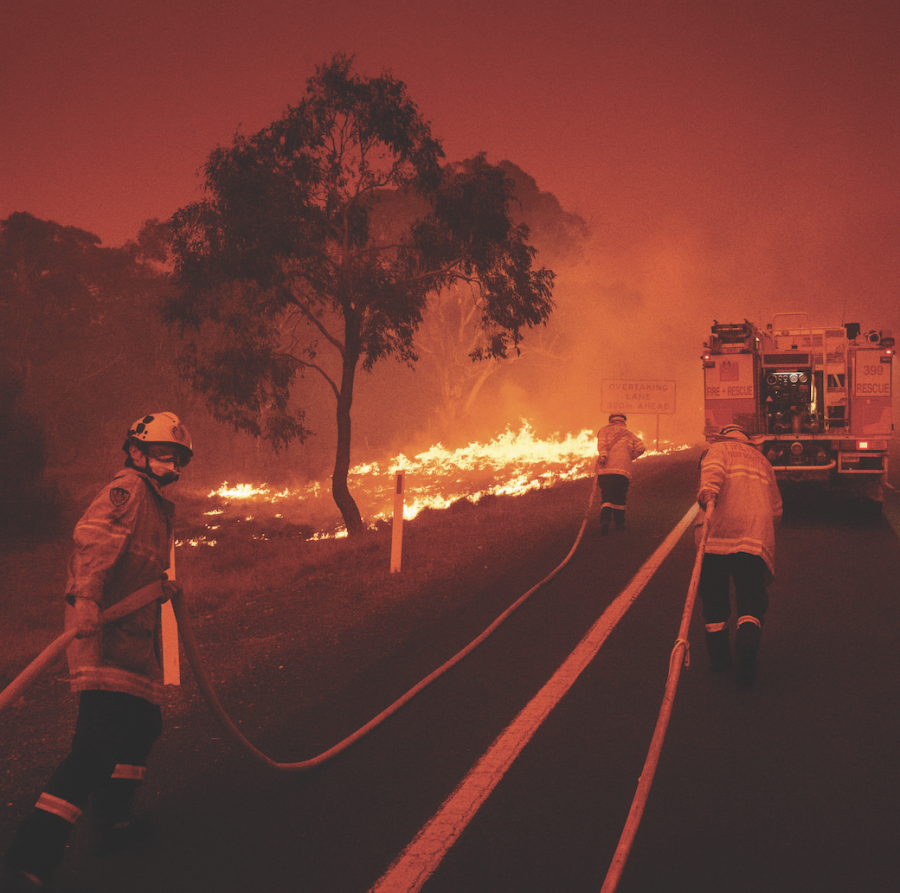Abroad Students Cope with Australia’s Bushfires, Lecture Discusses Impacts at Home
While Colgate students studying abroad in Wollongong and Sydney, Australia deal with the aftermath of recent widespread bushfires, the Environmental Studies Department discussed far-reaching implications of the crisis at a recent Brown Bag lecture. Though the fires have been quelled by recent rainstorms, the bushfires continue to be a critical concern for the Colgate community, both at home and abroad.
Held in the ALANA Cultural Center Friday, Feb. 14, “Australia’s Bushfires: Confronting Loss in an Era of Climate Change,” included a faculty panel of William R. Kenan Jr. Professor of Geography and Director of the Division of Social Sciences Adam Burnett, Associate Professor of Sociology Chris Henke, Associate Professor of Biology and Environmental Studies Gretchen Hoadley, Burke ‘81 Endowed Chair in Regional Studies Catherine Cardelús and Professor of Russian and Eurasian Studies and Environmental Studies and Director of the Environmental Studies Program Ian Helfant. Junior Caylea Barone, who traveled to Australia for the fall 2019 semester with Professor Henke on the Wollongong Study Group, moderated the panel.
Barone presented photographs from her time in Australia to demonstrate the shocking effects of the fires. She detailed the tangible impact on her abroad experience.
“It was very scary, and very real. Fires were burning to the north, west and south of our study group,” Barone said.
An atmospheric scientist, Burnett highlighted the catalysts of the bushfires, citing the on-going relationship between climate and precipitation.
“Temperature creates evaporation stress, which tends to dry things out, and models show that temperatures are going to continue to increase leading to more fires,” Burnett said.
Helfant attributes the international response to the bushfires to the significant media coverage and the centrality of human-animal interactions.
“The perception of charismatic mammals that are symbolic of Australia and emblematic of the catastrophe have captured the attention of people,” Helfant said in regards to the outpouring of support and awareness, palpable on campus.
The Australian bushfires also pose concerns for students currently studying abroad in Australia on Colgate’s faculty-led study group in Wollongong as well as an approved program in Sydney. According to Associate Director of Off-Campus Study Cas Sowa, the office continually monitors the situation.
“Off-Campus Study and a Colgate emergency operations team monitors the situation on-site through a number of ways including State and Department Travel Advisories, US and Australian government information and our local partners at the University of Wollongong and the University of Sydney. For students departing in late February, it was less of an issue as recent rains helped quell many of the fires. Colgate’s faculty director arrived in Australia well before the students, to help monitor the situation locally and make any decisions that could have impacted the program,” Sowa said.
Junior Kaitlin Colby is currently on Colgate’s approved study abroad program at the University of Sydney. Colby said that while she feels the Office of Off-Campus Study has provided little support and information about the wildfires, she hasn’t felt the fires have impacted her experience thus far.
“The Colgate study abroad offices honestly haven’t done anything and didn’t provide much information when the fires were going on/before I left. But my program, IFSA, was constantly sending us updates before we got here,” Colby said. “As for the fires now, there has been a lot of rain here so the fires have been going out and haven’t been affecting my experience much at all.”
Senior Madison Jozefiak said that the Brown Bag helped remind her of the existence and seriousness of climate change.
“Whether the effects of climate change are visible or not, we have to be aware of our impact as a species on the world at large. People don’t feel accountability for waste and CO2 emissions that are causing these catastrophes. I personally don’t feel motivated to make sustainable decisions unless I go to talks like these, which is why I think these events are so necessary on campus,” Jozefiak said.
The panelists encouraged participants to not only acknowledge the bleak situation but, as Helfant said, to utilize “empathy as a catalyst for change.”







